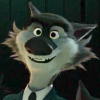Why talking animals in animation?
Posted by dronon on Thu 10 Apr 2003 - 09:02
An interesting column by Chris Robinson for Animation World Magazine, from July 2002, with his personal thoughts on why anthropomorphised animals are used so extensively in animation.

Comments
What, no comments on this article? Not even a simple "What does he mean 'arrogant'?!"
I don't have much to say about it either, other than if it'd been written by a furry, it would be much shorter, and read as follows:
"Why not?"
Uff. The guy uses a lot of lingo, but in the end he just spends a lot of time flailing around the concept and not hitting anything.
First, consider his dismissal of the root reason for human fascination with animals--- he claims that we're all fascinated with animals because we're surrounded with plush animal toys and colorful books with animals in them from infancy. Okay, "tail wagging the dog" comes to mind for that argument... he never addresses why people think it's such a great idea to make plush animal toys and draw cute animals in kids' books in the first place. We have animals in our pop culture because we're attracted to them, not the other way around.
Second, his accusation of 'arrogance' is rather silly. For one thing it ignores the fact that we do, after all, sit at the top of the food chain. It's hardly arrogance when you are the dominant species on the planet. For another, reading between the lines, it dismisses the human involvement with animals as anthropomorphic "projection"--- a truthful application when we're talking about seeing human traits in an inanimate object, but not so perceptive when talking about other living things. Only a dullard would deny that we DO have traits in common with other species; not merely the physical, such as pain, pleasure, hunger, thirst, weariness, etc. but also the capacity to feel happiness, sorrow, anger, fear, affection and even love. The anthropomorphising of animals is facilitated more by the fact that they already have things in common with us emotionally than by any mere egotistical desire to see our faces reflected in everything around us.
The latter desire to create anthropomorphic animal characters does spring from our childhood familiarity--- the cartoon characters, innocent and pure, utterly sympatico with our inner child, that we grew up with, and whom we wish to see given the full flower of human experience and dimension. But at a far deeper level, it springs from the fact that even a child who never had a teddy bear or picture book and never saw a Disney cartoon in his life is utterly convinced, in his deepest heart, that the family dog understands every word he says--- and would talk right back to the child if he only had a mind to.
Good points, all of them. The article does indeed read basically as "I hate talking animals! Why do other people like them? Let me sit here and pontificate and try to justify why I'm right and they're wrong."
(Replace "talking animals" with "videogames", "reality TV", "Democrats", "Republicans", "chocolate ice cream", or pretty much anything else, and someone somewhere has probably written an essay about it!)
Post new comment